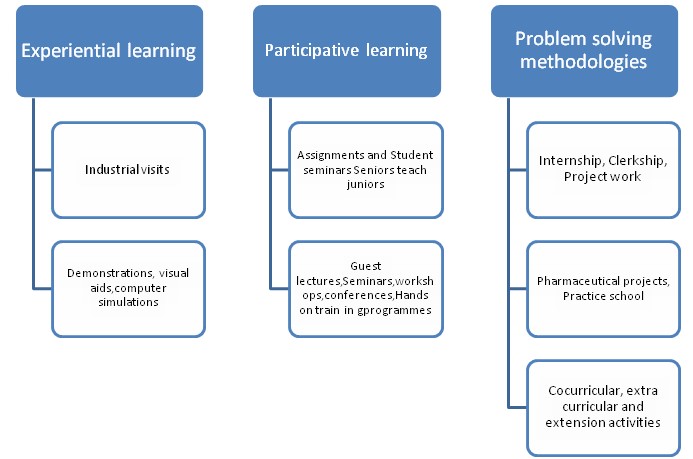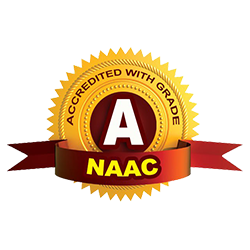STUDENT CENTRIC METHODS
Traditionally, the talk and chalk method is used, and our institution strives for innovative teaching methodologies to enrich the learning capabilities of students by adopting student-centric methods like experiential learning, participatory learning, and problem-solving methodologies. However, there has been a paradigm shift from the lecture method to modern tools of pedagogy.
The faculty members provide learning environment by engaging in rich experiential content of teaching through experimentation, demonstration, visual aids and periodical industrial visits as well.
Experimental Learning
Industrial visits and Field trips: The institution encourages the students for industrial visits and field trips to enhance their knowledge in practical exposure. Herbal garden visits and tours are also provided to the students.
Collaborative learning
Collaborative learning is organizing guest lectures where the concepts of the students are further enhanced as the guest lecturers shares their real life industrial examples.
Participative Learning
Institute uses participative learning to encourage students to actively involve them in learning process. The college methods for participative learning like — Assignments, Case Study, Project etc.,
Assignments: Students are allotted assignment topics in all courses to improve their linguistic skills and learning experiences.
Journal Club:Students and faculty gather to-discuss scientific paper/findings found in a research journal.
Seminars/Workshops/Conferences: Seminars, Workshops/ Conferences (National and international) are organized by the institute in which students participate to enrich their learning experience.
Problem solving methodologies: Problem-solving is often used to learn to work in teams, and similar "transferable skills" rather than the subject itself. It is also used as a method of assessment (rather than teaching)
Internship:Students during final year/immediately after completion of all courses. They are allowed to perform a year/ 1-month internship in an approved hospital/ industry / research laboratory/ drug testing laboratory / preclinical activity/ industrial pharmacy operations/ synthesis of Pharmaceuticals etc...
Clerkship/Hospital posting:Every student of Pharm.D program shall be posted in hospital for a period of 50hrs during second, third and fourth year of the Programme. In fifth year, every student shall spend half a day in the morning hours attending ward, rounds on daily basis as a part of clerkship.
Project work: Students during final semester(s) (B. Pharmacy and M. Pharmacy) and V year Pharm.D mandatory to undergo project work for 6 months to 1 year to buildup team work and group skills. Project work provides a learning experience in which students have the opportunity to synthesize knowledge from various areas of learning and apply critically and creatively to real-life situations.
Practice school: Practice school course is offered during seventh semester of undergraduate B.Pharm program, where every student shall undergo the course for a period of 150 hours in the areas of development of pharmaceutical formulations, industrial pharmacy operations, community pharmacy, Analytical methods development , Quality control and Quality Assurance, Synthesis of Chemical compounds, Pharmacological screening methods, Herbal extraction process.
Learning through extension activities: Students participate in extension activities like tree plantation, blood donation, swachh bharat abhiyan, NSS activities, health awareness programmes., it helps student to be a responsible citizen.




 1800-180-5522
1800-180-5522